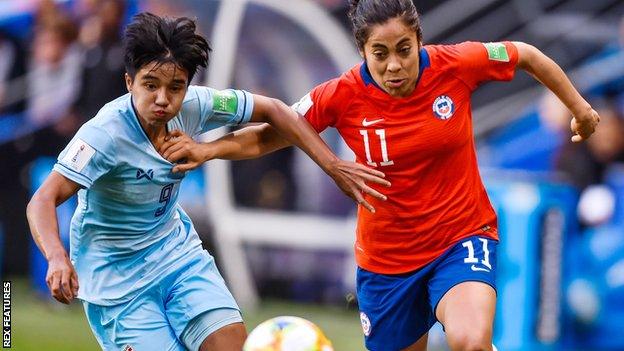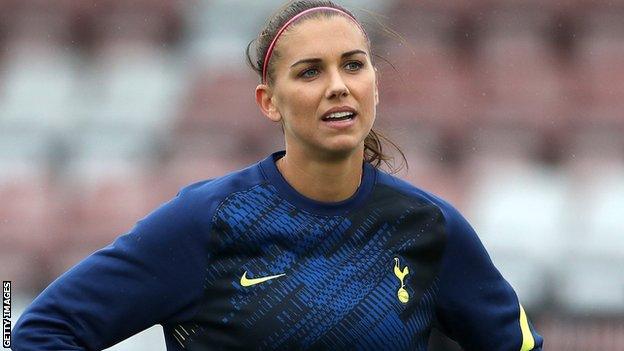Maternity leave: New Fifa proposals include transfer ban warning to clubs
- Published

More than a billion people around the world watched last summer's Women's World Cup
New maternity cover regulations aimed at protecting women footballers have been praised as "an essential step" for the sport.
Fifa could impose transfer bans on any clubs not meeting the new standards.
Football's international governing body has for the first time proposed worldwide maternity regulations for female players and coaches.
Players would be entitled to a minimum of 14 weeks of maternity cover, on at least two thirds of their salary.
The proposed regulations will require Fifa Council approval in December.
Fifa's chief legal and compliance officer, Emilio Garcia Silvero said: "The clubs will not be allowed to terminate the contract of a player on the grounds of a player becoming pregnant.
"If this is the case, we are going to impose not only a fine, and compensation to the player, but also a sporting sanction.
"We are going to impose a transfer ban on the club. From now on, female players will be better protected.
"We think these rules are common sense. There are some countries in which these rights are already there, but we are trying to regulate this for 211 different territories. These basic conditions will be mandatory from 1 January, 2021."
Under the proposals, clubs will be "under an obligation to reintegrate" players to the club and provide "adequate ongoing medical support".
The regulations also state that:
Clubs will be permitted to sign a female player outside of the usual transfer windows in cases where short-term cover is needed to replace a player on maternity leave
New mothers must be offered the opportunity to breastfeed and/or express milk
Fifa's proposed minimum of 14 weeks cover does not go as far as the statutory amount in many countries, including the United Kingdom, where maternity pay is available for up to 39 weeks.
In the UK, this includes 90% pay for the first six weeks and then £151.20 per week or 90% of average weekly earnings - whichever is lower - for weeks seven to 39.
'Hopefully this is the beginning'

US international Alex Morgan is now playing for Tottenham Hotspur after giving birth in May
"This is such an impactful and meaningful addition to our sport," said England international Jodie Taylor, a member of the global player council of world players' union Fifpro.
"Women's footballers need these types of regulations to ensure that we can continue our careers confident that adequate provisions are in place should we decide to have children, which is both reassuring for us as players and reflective of what the professional game needs to keep growing.
"Hopefully this is the beginning of even more progressive and inclusive policies for female players."
Argentina goalkeeper Gabriela Garton said: "This is a hugely important and essential step for women's football - for the players and for the sustainable growth of the game.
"We as players need these types of provisions and protections so that nobody has to choose between starting a family and continuing their football career, as some have had to do in the past."
Fifpro's general secretary Jonas Baer-Hoffmann added: "This is only a first step, because these regulations represent a minimum set of protections.
"We will continue to push - internationally and domestically - for more holistic parental policies and even more favourable conditions, such as longer maternity periods and considerations for parents in general.
"No player should face discrimination, and certainly not as a result of pregnancy or for tending to the basic human needs of a mother and her child after giving birth."

Life After Reality TV: Love Island and basketball star Ovie Soko
Racism in Football: See the scale of the problem in the game
